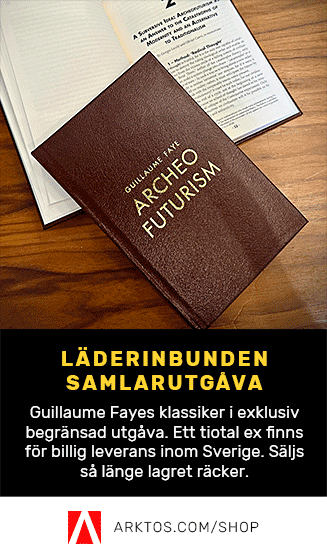I väntan på den sammanfattning om den Primordiala Traditionen som jag planerar, följer här ett stycke av traditionalisten Rene Guenon där den traditionalistiska synen på auktoritet och rojalitet sammanfattas på ett intressant och bra sätt. I alla historiska civilisationer före vår egen, inte minst i de indo-ariska kulturerna, har monarkens roll varit att vara en bro mellan den högre verkligheten, och vår värld. Ofta har monarken betraktats som ättling till gudarna, eller en gud själv. I jämförelse med detta står sig familjen Bernadotte milt sagt slätt. Det är ett sorgligt faktum att auktoritet i vår tid reducerats till att handla om antingen ren makt, ”folklighet” eller pengar, medan alla högre egenskaper (visdom och heder exempelvis) som tidigare förutsatts finnas hos makthavare lyser med sin frånvaro. Våra makthavare är inget annat än nollor i kostym, och även om man inte behöver vrida klockan tillbaka till medeltiden kan det vara intressant att undersöka den världsbild som låg bakom deras syn på auktoritet. Och det är det som Guenon gör i stycket som följer.
”The title ”King of the World”, taken in its highest, most complete, and at the same time most rigorous sense, applies properly to Manu, the primordial and universal legislator, whose name is found in diverse forms among a great many ancient peoples; in this regard, let us recall only Mina, or Menes, of the Egyptians, Menw of the Celts, and Minos of the Greeks. This name moreover does not designate a more or less legendary historical personage, but rather a principle, a cosmic Intelligence that reflects pure spiritual light and formulates the Law (Dharma) appropriate to the conditions of our world and of our cycle of existence; and at the same time it is the archetype of man, considered particularly insofar as he is a thinking being (in Sanskrit, manava).
Moreover, it is important to emphasize that this principle can be manifested through a spiritual center existing in the terrestrial world by an organization charged with preserving intact the deposit of sacred tradition, which is of ”non-human” origin(apaurusheya), through which primordial Wisdom is handed down across the ages to those capable of receiving it. The head of such an organization, representing in a way Manu himself, can legitimately bear his title and attributes; and what is more, the degree of knowledge he must have attained to exercise his function enables him to truly identify himself with the principle of which he is the human expression, as it were, and before which his individuality disappears. Such is indeed the case of Agarttha, if, as Saint-Yves maintains, this center has taken over the heritage of the ancient ”solar dynasty” which formerly resided at Ayodhya, and which traced its origin back to Vaivasvata, the Manu of the present cycle.
…………………………….
In the Middle Ages there was an expression in which these two complementary aspects of authority were joined in an interesting way. At that time frequent mention was made of a mysterious region called the ”Kingdom of Prester John”. Now this was at a time when what could be called the ”outer covering” of the initiatic center in question was formed in large part by Nestorians and by Sabaeans.”
Mer följer.












